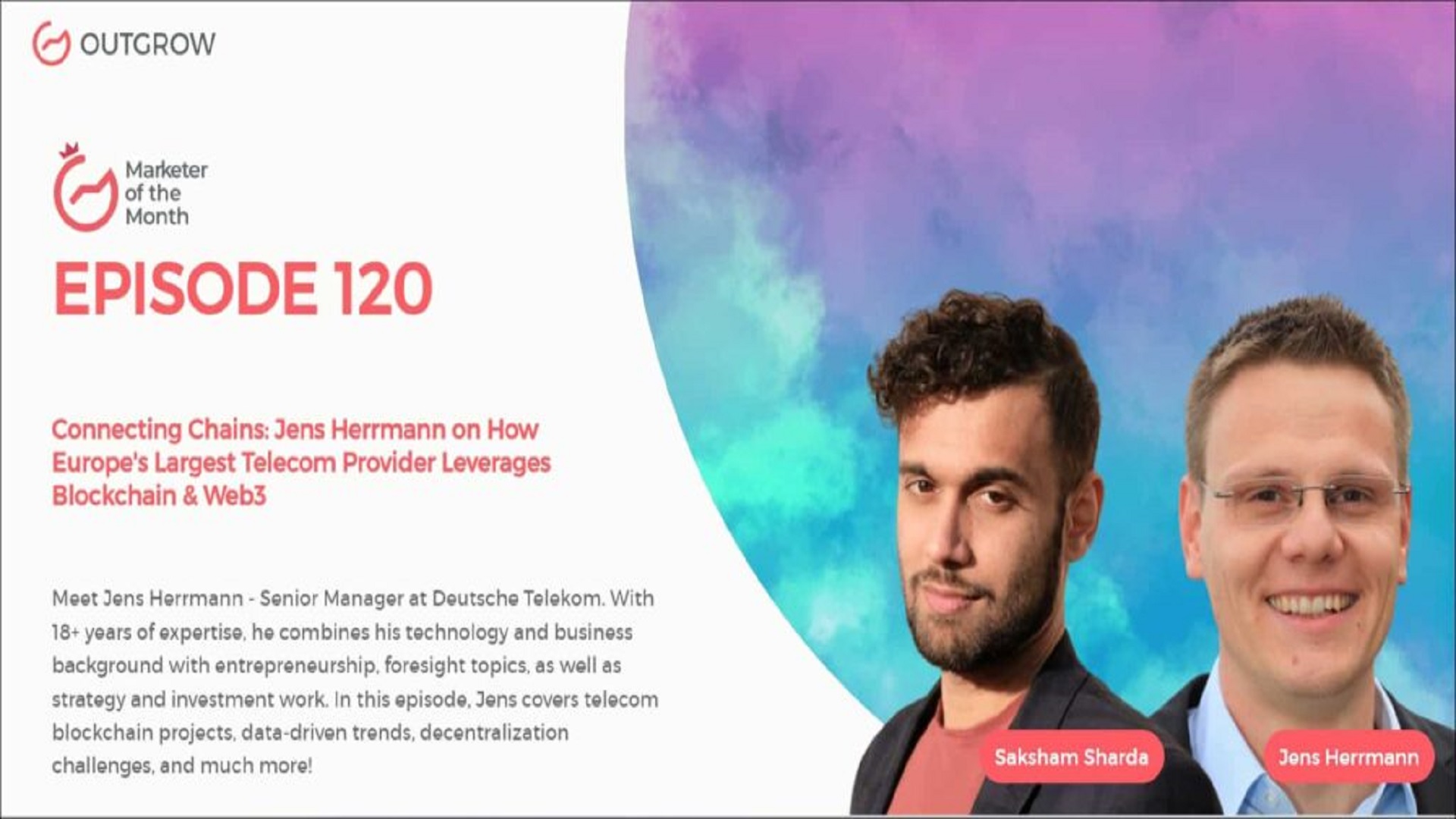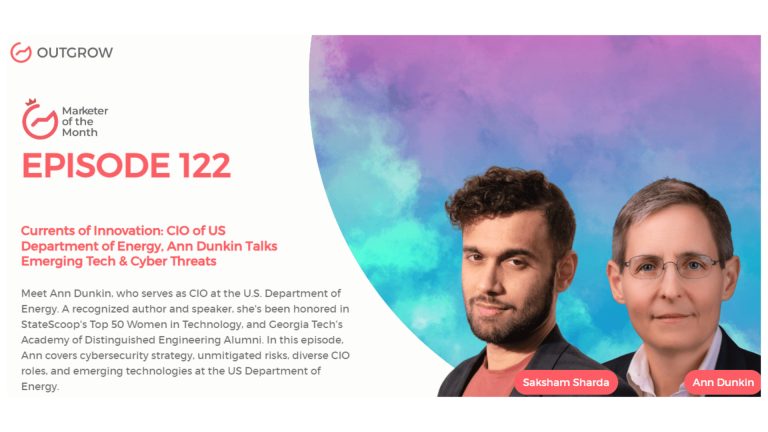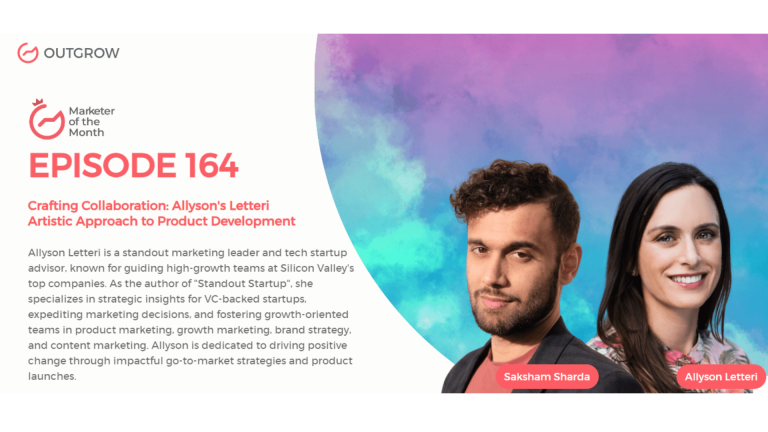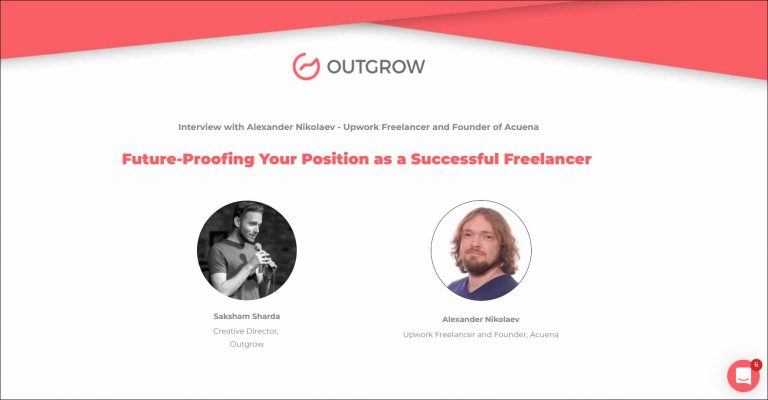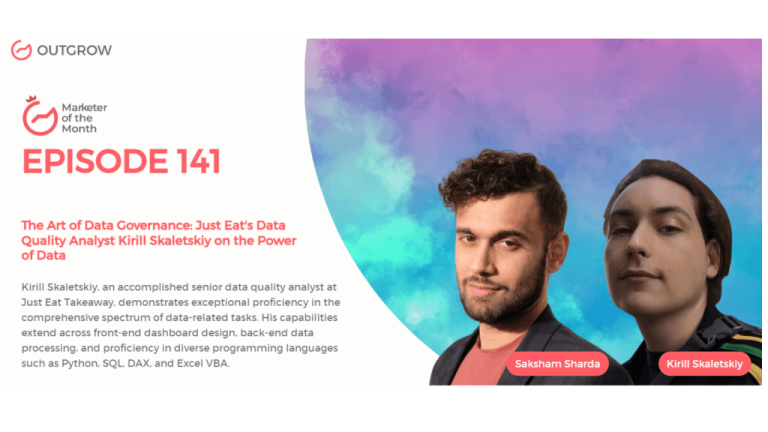Summarize with :
EPISODE 120: Marketer of the Month Podcast with Jens Herrmann
Table of Contents
Hey there! Welcome to the Marketer Of The Month blog!
We recently interviewed Jens Herrmann for our monthly podcast – ‘Marketer of the Month’! We had some amazing insightful conversations with Jens and here’s what we discussed about-
1. Targeted Blockchain Projects for Telecom Needs- Emphasis on projects aligning with telecom requirements, including public blockchain and infrastructure staking.
2. Innovative Web3 Startups- Future of startups like Clear X and Telo Puno propelling blockchain advancements.
3. Cross-Industry Collaboration Drives Web3 Innovation- Collaboration across sectors, including startups, fostering progress in the Web3 landscape
4. Focusing on telecom-aligned goals, especially infrastructure and B2B sectors.
5. Data-Driven Trend Identification- Data analysis driving trend recognition and initiatives like staking
6. Balancing Decentralization and Tradition- Challenges of integrating decentralization with control
About our host:
Dr. Saksham Sharda is the Chief Information Officer at Outgrow.co. He specializes in data collection, analysis, filtering, and transfer by means of widgets and applets. Interactive, cultural, and trending widgets designed by him have been featured on TrendHunter, Alibaba, ProductHunt, New York Marketing Association, FactoryBerlin, Digimarcon Silicon Valley, and at The European Affiliate Summit.
About our guest:
Jens Herrmann is Senior Manager at Deutsche Telekom. With 18+ years of expertise, he combines his technology and business background with entrepreneurship, foresight topics, as well as strategy and investment work. In this episode, Jens covers telecom blockchain projects, data-driven trends, decentralization challenges, and much more!
Connecting Chains: Jens Herrmann on How Europe’s Largest Telecom Provider Leverages Blockchain & Web3
The Intro!
Saksham Sharda: Hi, everyone. Welcome to another episode of Outgrow’s Marketer of the Month. I’m your host, Dr. Saksham Sharda, and I’m the creative director at Outgrow. co. And for this month we are going to Jens Herrmann who is the Senior Manager at Deutsche Telekom.
Jens Herrmann: Great to be here. Thank you.
Don’t have time to read? No problem, just watch the Podcast!
Or you can just listen to it on Spotify!
The Rapid Fire Round!
Saksham Sharda: So let’s start with the first one. This is a rapid-fire round. If you don’t want to answer a question, you can just say pass.
Jens Herrmann: Good.
Saksham Sharda: At what age do you want to retire?
Jens Herrmann: 40.
Saksham Sharda: What’s your favorite mobile app?
Jens Herrmann: No idea. I have so many.
Saksham Sharda: How long does it take you to get ready in the morning?
Jens Herrmann: An hour or so.
Saksham Sharda: Most embarrassing moment of your life?
Jens Herrmann: Actually, a couple of times I’m grading into the middle and riding in the wrong way.
Saksham Sharda: Mountains or beaches?
Jens Herrmann: Both.
Saksham Sharda: What’s the most useful mobile feature you can’t live without?
Jens Herrmann: Google Maps.
Saksham Sharda: Favorite color?
Jens Herrmann: Magenta.
Saksham Sharda: What time of day are you most inspired?
Jens Herrmann: All day.
Saksham Sharda: How many hours of sleep can you survive on?
Jens Herrmann: Pretty long. At least eight hours.
Saksham Sharda: Okay, Fill in the blank. An upcoming technology trend is ______.
Jens Herrmann: An upcoming tech trend is for sure, Web3.
Saksham Sharda: The city in which the best kiss of your life happened?
Jens Herrmann: My hometown.
Saksham Sharda: Okay.
Saksham Sharda: Android or Apple?
Jens Herrmann: Apple.
Saksham Sharda: The biggest mistake of your career?
Jens Herrmann: I said no to some interesting opportunities.
Saksham Sharda: How do you relax?
Jens Herrmann: Sports.
Saksham Sharda: How many cups of coffee do you drink per day?
Jens Herrmann: None.
Saksham Sharda: A habit of yours that you hate?
Jens Herrmann: Nothing. I like myself.
Saksham Sharda: The most valuable skill you’ve learned in life?
Jens Herrmann: Digesting information.
Saksham Sharda: Cities or countryside?
Jens Herrmann: Now countryside.
Saksham Sharda: The last one is what is your favorite Netflix show?
Jens Herrmann: Inside Bill Gates’ brain.
The Big Questions!
Saksham Sharda: So let’s go into the longer questions. You can answer with as much ease as you’d like. How do you prioritize which Web3 and Blockchain initiatives to pursue, and what factors do you consider in making those decisions?
Jens Herrmann: Since we are at tech or we are trying to figure out what are our use cases that are also relevant from a telco point of view. And we started pretty early in the blockchain. We looked into private blockchains and public blockchains. Figured out after a while, public and private blockchains won’t do it really for us from a business point of view, but public for sure. And so we went into staking something that we can utilize for our infrastructure and figured out this is something we want to engage with further.
Saksham Sharda: And which one do you personally find the most exciting?
Jens Herrmann: Of course the public space.
Saksham Sharda: Okay. So you’ve mentioned the importance of collaboration and knowledge exchange among different industries and strategy units. How do you see this playing out in the current business landscape?
Jens Herrmann: I guess it is really important that you collaborate across different industries. Specifically in emerging technologies like Web 3, we as telcos won’t have the answer for everything, and specific needs will change. To some extent, we need to learn from smaller startup companies that are already engaging in this ecosystem to learn from each other and figure out, hey, if we team together, what can we do? How can we change, let’s say some of our business behaviors create new businesses and do something really valuable for the users? So that’s why intercompany exchanges are needed.
Saksham Sharda: And what are some of the exciting startups that are out there right now, you think?
Jens Herrmann: There are a couple we are engaging with, say blockchain for sure. There are a couple of one that comes to this later on Clear X for example, a company that was also typically invested in, same with Telo Puno, they’re all like a mentor for example, how to do stablecoins and in such an easy way. So there is a lot of interesting stuff coming up.
Saksham Sharda: So how do you ensure that the Web3 and Blockchain initiatives you manage align with Deutsche Telekom’s overall business strategy and objectives?
Jens Herrmann: Very good question, I guess it’s key that they need to align. So it would be super tough to do something that is not in our scope or does not fit some of our strategy at all. But if you look into the topic of blockchain and specifically the infrastructure side, we as telcos built infrastructure for decades. And, in Web Three, it’s the same thing, you rely on infrastructure. Therefore, everything we do has to some extent infrastructure focus. And we also look into B2B-related topics to simulated topics. So this is pretty much close to the strategy that we have
Saksham Sharda: And how do you do these negotiations with the infrastructure team?
Jens Herrmann: So I mean they came to us and said, Hey, we have something interesting, can we look into this one? And to some extent, since you’re very active, this is just another workload on the cloud and therefore it fits perfectly.
Saksham Sharda: Can you walk me through a specific example of how you have used data analysis to identify a trend or opportunity within the Web3 and Blockchain ecosystem?
Jens Herrmann: So data analysis is really important to identify trends. We somehow need to look into trends, monitor trends, create them, and figure out what the impact of the trend and for us as an industry and how to deal with this one, so, therefore, we use a lot of analyzers and action items. What does it mean for us? How can we engage and click trigger real actions out of this one? For example, the whole Web3 initiative that we are doing sitting on the staking side on the blockchain side came out because we were monitoring the trends in the industry very carefully.
Saksham Sharda: Can you provide an example of how you have leveraged Distributed Ledger Technologies to improve a core telco topic such as Communications or IP networks?
Jens Herrmann: Well, there’s a couple. I mean, I mentioned before that we are engaging, for example, in the tailor ecosystem the tailor blockchain and we provide infrastructure for the tailor. Blockchain lets staking king and Oracle infrastructure, but also our traditional telco infrastructure. And by traditional, I mean traditional. For example, for two-factor authentications, we enable these services for the ecosystem for a blockchain environment that can use our SMS infrastructure to authenticate users on the blockchain.
Saksham Sharda: And how do you balance the potential benefits of decentralized business models with the challenges and risks that come with implementing them within a traditional telecommunications company?
Jens Herrmann: So it’s very complex to say. So if you look at decentralized business models and the impact that they will have for us as a company, we need to find a way to deal with basically what’s happening on the decentralized and how this impacts, let’s say focus on the centralized approach. For example, to roll out infrastructure and also, to manage certain services that are out of our hands to some extent, but we still want to control the user behavior. So it’s really necessary that decentralized business models somehow find a way to coexist and that we can leverage both of them. This is the key. It’s not an easy answer. And then for sure, we have not figured it out fully to some extent. I mean, even the whole industry is now still looking at this one. Oh wow, what’s the impact for us? But we are aware of a way to get there.
Saksham Sharda: And what are some of the problems that are choking up when these two systems are combined with each other?
Jens Herrmann: It’s different business interests and different customer engagement interests, for example, and also interests on how to deal now with the complexity of this stuff.
Saksham Sharda: How do you measure the success of Deutsche Telekom’s Web3 and Blockchain initiatives, and what metrics do you use to evaluate their performance?
Jens Herrmann: So currently our main focus is really on the infrastructure part to scale our staking business. We are looking into how we can scale our staking business. So we would measure it, for example, for now, how many networks we have that we support on the staking side, how many assets the stake we have. So this would be, let’s say some of the trigger points.
Saksham Sharda: And, what are some things that you think you’re unable to measure and some things that cannot be shown through measurement?
Jens Herrmann: So some things that cannot be shown are most of the stuff, I mean, it’s somehow measurable. If you see with customer satisfaction, how you differentiate yourself from others that are in this ecosystem, let’s say the unique story behind it. So these are the things.
Saksham Sharda: So the last question for you is of a personal kind. What would you be doing in life, if not this right now?
Jens Herrmann: Probably I would be somewhere in a nice area where there is a beach and there’s mountain stuff like that.
Saksham Sharda: That was great.
Let’s Conclude!
Saksham Sharda: Thanks, everyone for joining us for this month’s episode of Outgrow’s Marketer of the Month. That was Jens Herrmann, Senior Manager at Deutsche Telekom.
Jens Herrmann: Pleasure. Thanks for having me.
Saksham Sharda: Check out the website for more details and we’ll see you once again next month with another marketer of the month.

